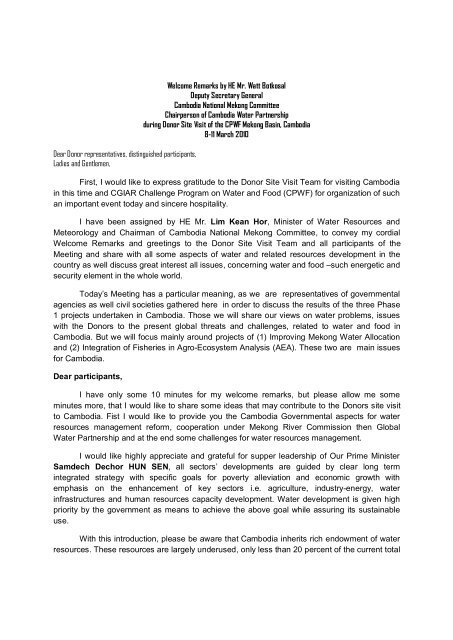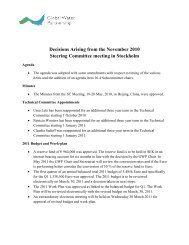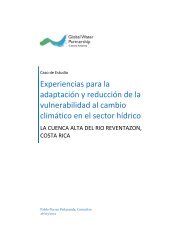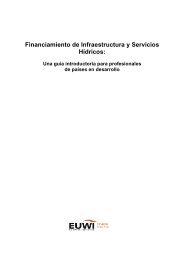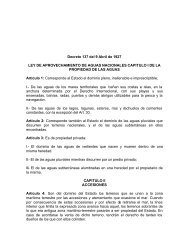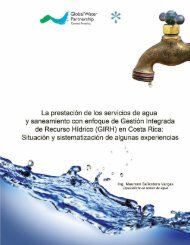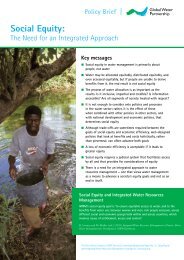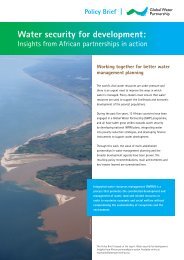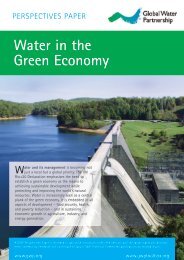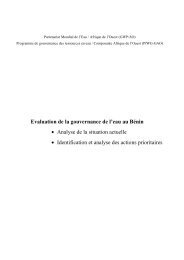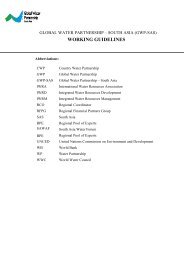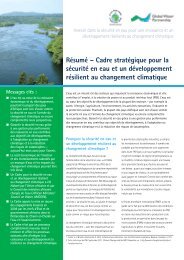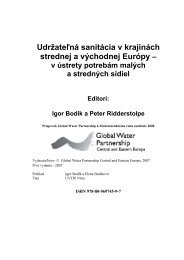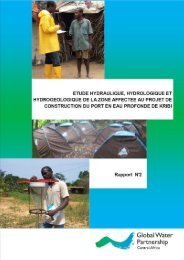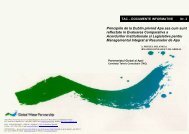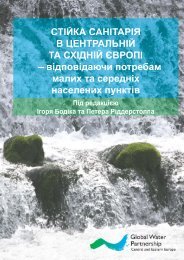Remarks by HE Mr. Watt Botkosal Deputy Secretary General
Remarks by HE Mr. Watt Botkosal Deputy Secretary General
Remarks by HE Mr. Watt Botkosal Deputy Secretary General
Create successful ePaper yourself
Turn your PDF publications into a flip-book with our unique Google optimized e-Paper software.
Dear Donor representatives, distinguished participants,<br />
Ladies and Gentlemen,<br />
Welcome <strong>Remarks</strong> <strong>by</strong> <strong>HE</strong> <strong>Mr</strong>. <strong>Watt</strong> <strong>Botkosal</strong><br />
<strong>Deputy</strong> <strong>Secretary</strong> <strong>General</strong><br />
Cambodia National Mekong Committee<br />
Chairperson of Cambodia Water Partnership<br />
during Donor Site Visit of the CPWF Mekong Basin, Cambodia<br />
8-11 March 2010<br />
First, I would like to express gratitude to the Donor Site Visit Team for visiting Cambodia<br />
in this time and CGIAR Challenge Program on Water and Food (CPWF) for organization of such<br />
an important event today and sincere hospitality.<br />
I have been assigned <strong>by</strong> <strong>HE</strong> <strong>Mr</strong>. Lim Kean Hor, Minister of Water Resources and<br />
Meteorology and Chairman of Cambodia National Mekong Committee, to convey my cordial<br />
Welcome <strong>Remarks</strong> and greetings to the Donor Site Visit Team and all participants of the<br />
Meeting and share with all some aspects of water and related resources development in the<br />
country as well discuss great interest all issues, concerning water and food –such energetic and<br />
security element in the whole world.<br />
Today’s Meeting has a particular meaning, as we are representatives of governmental<br />
agencies as well civil societies gathered here in order to discuss the results of the three Phase<br />
1 projects undertaken in Cambodia. Those we will share our views on water problems, issues<br />
with the Donors to the present global threats and challenges, related to water and food in<br />
Cambodia. But we will focus mainly around projects of (1) Improving Mekong Water Allocation<br />
and (2) Integration of Fisheries in Agro-Ecosystem Analysis (AEA). These two are main issues<br />
for Cambodia.<br />
Dear participants,<br />
I have only some 10 minutes for my welcome remarks, but please allow me some<br />
minutes more, that I would like to share some ideas that may contribute to the Donors site visit<br />
to Cambodia. Fist I would like to provide you the Cambodia Governmental aspects for water<br />
resources management reform, cooperation under Mekong River Commission then Global<br />
Water Partnership and at the end some challenges for water resources management.<br />
I would like highly appreciate and grateful for supper leadership of Our Prime Minister<br />
Samdech Dechor HUN SEN, all sectors’ developments are guided <strong>by</strong> clear long term<br />
integrated strategy with specific goals for poverty alleviation and economic growth with<br />
emphasis on the enhancement of key sectors i.e. agriculture, industry-energy, water<br />
infrastructures and human resources capacity development. Water development is given high<br />
priority <strong>by</strong> the government as means to achieve the above goal while assuring its sustainable<br />
use.<br />
With this introduction, please be aware that Cambodia inherits rich endowment of water<br />
resources. These resources are largely underused, only less than 20 percent of the current total
cultivated areas of some 2.5 million ha are irrigated and in hydropower only less than 1 percent<br />
of potential installed capacity has been developed. More than 85 percent of the population is<br />
living in the countryside most of them practicing subsistence rice farming and depending on<br />
agricultural pursuits. Public investment in national infrastructure is relatively low especially in<br />
water resources management sector as compared to neighboring countries. Although<br />
agriculture has about 37% of the GDP share, the growth is relatively low only 3.5 percent per<br />
year while population growth is about 2.5 % per year. Inland navigation potential has been<br />
neglected for years, while other means in the transport sector are <strong>by</strong> far inadequate to reduce<br />
transportation cost for achieving competitive agricultural cost and improving poverty rate.<br />
The Government Rectangular Strategy-Phase II defined four IWRM-relevant strategic<br />
growth rectangles:<br />
‣ i) agricultural productivity, diversification, and competitiveness;<br />
‣ ii) private sector growth and employment;<br />
‣ iii) rehabilitation and construction of physical infrastructure; and<br />
‣ iv) capacity building and human resource development, based on which 5 water related<br />
national development goals were developed in line with National Strategic Development<br />
Plan (2006-2010) with regard to<br />
• (1) national economic development;<br />
• (2) food security; poverty alleviation in towns and in rural areas;<br />
• (3) Rural livelihood consolidation and development;<br />
• (4) Environmental protection and<br />
• (5) International competitiveness to WTO member as well as ASIAN.<br />
I would like to underline that the Royal Government of Cambodia has been committing<br />
for water development and management in the country. The existing National Water Resources<br />
Policy (MOWRAM, 2004), set up a clear Vision for Water to ensure the effective, sustainable,<br />
wise and equitable use of water resources. a part of broad programme to protect, manage, and<br />
assure sustainable exploitation of both freshwater and marine resources while enhancing biodiversity<br />
and sustainability for equitable benefit to the public. The Policy guided Water<br />
resources management that will be integrated all aspects of<br />
• agricultural development;<br />
• water resources development – Irrigation for increasing productivity;<br />
• Fisheries development – natural capture and aquaculture;<br />
• Hydropower development;
• Navigation;<br />
• Watershed management;<br />
• Tourism and recreation;<br />
• Water supply and sanitation and<br />
• Flood management and mitigation.<br />
The main national legal framework for Water Resources Management is the LAW ON<br />
WATER RESOURCES MANAGEMENT OF T<strong>HE</strong> KINGDOM OF CAMBODIA<br />
• Article 1<br />
The purpose of this Law is to foster the effective and sustainable management of the<br />
water resources of the Kingdom of Cambodia to attain socio-economic development and the<br />
welfare of the people.<br />
This Law shall determine:<br />
• The rights and obligations of water users,<br />
• The fundamental principles of water resources management, and<br />
• The participation of water users associations in the sustainable development of water<br />
resources.<br />
Article 4<br />
Water resources shall be developed and managed following an integrated water<br />
resources management approach.<br />
An integrated water resource management approach (IWRM) shall consider:<br />
• all aspects of water resources<br />
• linkages between the water resources and other aspects of the natural environment all<br />
demands for effective and sustainable water utilization for human and environmental<br />
purposes.<br />
The implementation of the integrated water resources management approach should be<br />
work at the same time and collaborative among all line ministries.<br />
I would like to emphasis that there are still many shortcomings and challenges that Cambodia<br />
must overcome to realize the agreed goals of CMDGs with targets (CMDG7 has set a<br />
benchmark for year 2015) as follow:<br />
1. Maintain forest coverage of 60% of total land area
2. Maintain the surface of 23 protected areas equal to 3.3 million hectares<br />
3. Maintain the surface of 6 new forest-protected areas equal to 1.35 million hectares<br />
4. Increase the number of rangers to 1200 in protected areas and 500 in forest-protected<br />
areas<br />
5. Increase the proportion of fishing lots released to local communities to 60%<br />
6. Increase the number of community-based fisheries to 589<br />
7. Increase the surface of fish sanctuaries to 580800 hectares<br />
8. Reduce the fuel wood dependency to 52%<br />
9. Increase the proportion of rural population to 50% and urban population to 80% with<br />
access to safe water.<br />
10. Increase the proportion of rural population to 30% and urban population to 74% with<br />
access to improved sanitation.<br />
I would like to highlight major institutional arrangement for national water resources<br />
coordination apex in the country.<br />
Existing the top National Coordinating Agency for Water Resources Management and<br />
Development mainly in the Mekong Context, is the Cambodia National Mekong Committee<br />
(CNMC) is a national institution operating directly under the Royal Government of Cambodia, to<br />
assist and advise the latter in all matters relating to the formulation of water policy, strategy,<br />
management, preservation, investigation, planning, restoration and the development of the<br />
water and other related natural resources of the Mekong River Basin within the whole country<br />
contributing to the sustainable development of national economy and infrastructure for the<br />
benefit of the country and people.<br />
The CNMC shall have the mandates and responsibilities as follow:<br />
• To investigate and submit to the Royal Government for its perusal all matters relating to<br />
the planning, formulation of strategy for development, management and preservation of<br />
water and other related natural resources in the Mekong River Basin.<br />
• To co-operate, advise and monitor other units of the Ministries concerned, provinces and<br />
towns, for the implementation of all relevant decisions of the Royal Government relating<br />
to the Mekong River.<br />
• To promote co-operation with NMCs of all MRC member states, donor countries and<br />
various international organisations in analysis, study and development, management<br />
and preservation of water and other related natural resources of the Mekong River,<br />
consistent with the equal, reasonable benefit for all member states.
• To effect co-ordination and arrangement with the MRC and donor community to mobilise<br />
fund to promote the study and development of projects efficiently and effectively.<br />
Mekong River Commission Framework<br />
Mekong River Commission (MRC) is the successor of the Mekong Committee created in<br />
1957, in 1995, the Mekong Agreement, signed <strong>by</strong> four riparian countries, Cambodia, Lao PDR,<br />
Thailand and Vietnam, there are key rules and procedures were developed such as Procedures<br />
for Data and Information Exchange and Sharing Procedures for Water Use Monitoring,<br />
Procedures for Notification, Prior Consultation and Agreement, Procedures for Maintenance of<br />
Flows on the Mainstream; draft Procedures for Water Quality. These will be implemented at<br />
Regional and national levels. At the regional level, MRC will concentrate on core functions,<br />
among others: analysis and modelling, planning and implementation of these procedures.<br />
The Basin Development Plan program of the MRC participated fully <strong>by</strong> 4 riparian<br />
countries with other stakeholders have created the Basin Development plan process since<br />
2001, divided the Lower Mekong Basin into 10 Sub-areas as planning units, developed basic<br />
IWRM Strategic directions, national, transboundary and regional plan were proposed. The major<br />
outputs of the BDP in the second phase, now going to be finished, the key outputs will be<br />
produced <strong>by</strong> the program include IWRM-rolling planning process include the formulation of the<br />
scenarios and it assessment, the project portfolio and the IWRM-based basin development<br />
strategy; Strengthening the IWRM capacity; Approaches include the economic development,<br />
environmental protection and the social development and equity.<br />
What is Global Water Partnership<br />
The Global Water Partnership (GWP) was set up in 1996 to help focus the attention of all<br />
water stakeholders on the necessity to develop and manage water resources in an integrated<br />
way. Beyond awareness raising, GWP’s mission statement refers to a role of strategic<br />
assistance to the countries on the path towards Integrated Water Resources Management<br />
(IWRM). Cambodia has been working with GWP since 2006 while its Country Water Partnership<br />
was officially established in 2009, September as a network that liaises with agencies,<br />
institutions, businesses, social entities, professional associations, scientists, NGOs, and water<br />
users in the water sector and its related management areas.<br />
Its overall goal is to support the country in the sustainable management of its water<br />
resources through an IWRM approach.<br />
The Cambo WP has four main objectives:<br />
1. Assist the national line agencies and all stakeholders concerned with waters<br />
resources management, development and conservation through promoting IWRM<br />
concepts;<br />
2. Serve as the platform and forum for all participants including political and<br />
professional levels to have dialogue to promote IWRM principles;<br />
3. Learn, exchange and share information and experiences, capacity building in IWRM<br />
planning and implementation, communication, development and research; and
4. Help realizing the Government Water Policies and Strategies <strong>by</strong> promoting IWRM<br />
programs.<br />
From the above commitment there are challenges in Water Resources Management in<br />
Cambodia<br />
• Strong commitment for IWRM promotion and implementation of agencies related to<br />
water management and development <strong>by</strong> overcoming their fragmented responsibilities<br />
and overcome and change the traditional single sector management approach to<br />
integrated or multi-sector management approach.<br />
• Set-up proper mechanism with full participatory approach for monitor and evaluate the<br />
decree of enforcement of policies and strategies as well as water Law<br />
Needs for Water Resources Management Reform<br />
• Existing policies and strategies and development plans of water and related resources<br />
are required to be reformed and revised with integration of IWRM aspects<br />
• Set-up effective mechanism that participated <strong>by</strong> key identified stakeholders and build its<br />
capacity to assist review national policies and strategies for promotion of water<br />
governance at national and local level.<br />
• Water Law and other related natural resources laws are required to be widely oriented<br />
and its interpretation would be made for better understanding and simple and<br />
effective enforcement <strong>by</strong> all<br />
• Set-up a national IWRM framework that orient for social, economic development and<br />
environmental protection based on that IWRM-based strategic plan and action plan<br />
setting up.<br />
• Set-up clear financial instruments and incentives for supporting of IWRM implementation<br />
at national and local level<br />
• Strengthen and build up capacity in IWRM institution and human resources in terms of<br />
decision making, public participation, technical and legal, economic, social and<br />
environmental aspect.<br />
• Set-up the strategy and guideline for river basin organization and management at the<br />
national, provincial and transboundary (with different countries) level.<br />
Water Resources Management needed to be reformed for better WRM<br />
• For better water governance system will help to establish a concrete and fundamental<br />
system at local river basin for sustainable socioeconomic development and
environmental protection orientation, enhance effective enforcement of Water Law with<br />
aspects of better water governance at local river basin system.<br />
• The effective WRM in this context will help to correct or improve the implementation of<br />
national policies between local and national level, to avoid any overlap responsibilities,<br />
but well coordinate among different level as well as people concerned in water and<br />
related natural resources actors.<br />
• Need for better WRM i.e. water governance that will set up better transparency,<br />
accountability and sustainable and strong public participation in the whole system of<br />
decision making and development plan cycle and will help to promote better<br />
governance, aspiration of people in the Government system in terms of administration,<br />
technical and management aspect.<br />
• The outcomes of water governance system at river basin level will help to build strong<br />
capacity of local institutions that coordinate efforts to manage water with efforts to<br />
manage other related natural resources in wider sector aspects to achieve sustainable<br />
socioeconomic development and environment protection at under-national level<br />
especially for poverty reduction.<br />
• Reform for better governance of water resources based on IWRM<br />
• Sectors policies are not well integrated for WRM<br />
• Decision making process still not clear for WRM<br />
• Institutional functions: limited coordination and cooperation for WRM<br />
• Capacity of institutions and their human resources are required for better capacity for<br />
their more effective functions to deal with IWRM<br />
• Water must be the first agenda for national soco-economic development growth and<br />
environmental protection. Recognized that water is for poverty reduction then needs for<br />
better WRM<br />
Dear ladies and gentlemen and participants,<br />
In conclusion I would like to note that Cambodia always adheres to principles of<br />
sovereign equality, territorial integrity, cooperation, mutual benefit and conscientious fulfillment<br />
of commitments which are fundamental norms of international law. On the basis of these<br />
principles, Cambodia is ready for broad and comprehensive cooperation with all Mekong<br />
riparian countries on the mutually beneficial basis.<br />
We are going our open dialogue and discussions, based on principles of trust and<br />
openness with all our stakeholders and partners, will promote mutually beneficial cooperation<br />
and lead to formation of transparent, effective and competitive water and food and optimal<br />
development and use of hydropower development potential of Cambodia, taking into account of<br />
environmental protection of natural resources.
Closing my remarks, I would like to thank on behalf of the Royal Government of<br />
Cambodia, Cambodia National Mekong Committee and Cambodia Water Partnership, thank<br />
you again and welcome for organizing this important event and given me occasion for taking<br />
part with my speech.<br />
Finally, I would like to thank all Donors, especially for these selected projects for<br />
Cambodia, thanks to all your participation...I wish you all successful mission in Cambodia.<br />
Thank you for attention!


